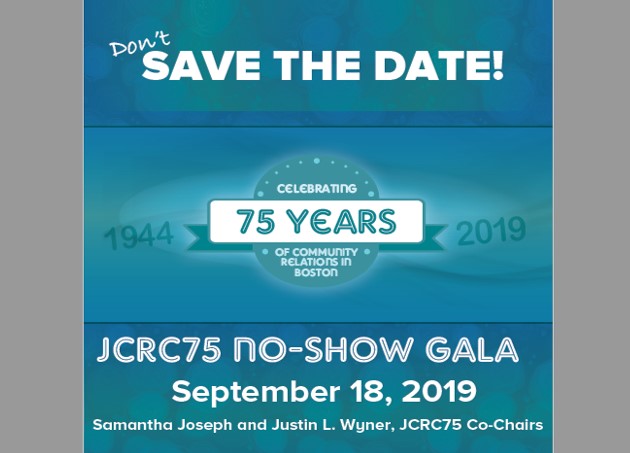Seventy-five years ago today, on June 14, 1944, leaders of sixteen local Jewish organizations gathered in Boston. These groups formed what has since come to be thought of as the “organized Jewish community,” by founding an umbrella institution “for the purpose of acting in unity in matters relating to civic protection” for the community — the Jewish Community Council, now known as JCRC.
This act of unity emerged from a climate of fear and urgency. Fear — of rising antisemitism and attacks on Jews in the streets of Boston. Urgency — in the face of the coming wave of refugees expected after World War II (this occurring just a week after D-Day), the overwhelming needs of a broken sister community in Europe after the Shoah, and very soon thereafter, a Jewish community in the Palestine Mandate on their journey to statehood in need of support.
This organized community, this JCRC, quickly came to understand that “civic protection” required civic engagement. That the strongest defense against antisemitism included standing up for civil rights, against hatreds and bigotries of all forms, for a democratic and pluralistic American society.
I suspect that, when we celebrated our fiftieth anniversary in 1994 – shortly after the end of the Cold War, amidst the hopes after Oslo, and with rapidly increasing Jewish leadership at the highest levels of government – few imagined that in 25 years we’d be struggling anew with rising antisemitism in America, with increasing demonization of Israel, and with existential concern over the future of American liberal democracy and our leadership in the world.
Over the last nine months, as part of a strategic planning process, JCRC conducted interviews, focus groups and surveys with 91 people from across the community.
When we asked our stakeholders to describe a single moment affirming the unique value of our Council, they had no difficulty naming it; it was our communal response after the horror of Pittsburgh last fall. That powerful day, when we gathered at the Boston Common bandstand to mourn the unthinkable loss to our People, tells a paradoxical story of the enduring truths that connect us to our moment of founding, and acknowledging how far we’ve come since then.
Back in 1944, the still-unorganized Jewish community leaders were scrambling in the face of impunity for violent attackers of Jewish kids in our streets, and the reality of a community too weak to compel action. They didn’t have the relationships – with local government, media, and other faith communities – to demand and secure action. Compare this with the scene on the Common last fall, when we were surrounded by federal, state, and local officials, law enforcement, and the leadership of virtually every major Christian and Muslim institution, all there to demonstrate their solidarity and support.
What we heard from our stakeholders is that what we do is just as vital now as it was 75 years ago – organizing Jewish leadership, building deep interfaith connections to protect and defend our community’s interests. Much has changed in these years, including the fact that now these relationships enable us to work toward a more ambitious agenda, on a broader scale throughout Greater Boston; recognizing that the health and vibrancy of the broader community serves our interests as well. Through our network of agencies and organizations, today we are a community with the capacity and commitment to embody the teaching of Hillel:
“If I am not for myself, who will be for me? If I am only for myself, what am I? And if not now, when?”
Community relations and engagement in the public square are as powerful in meeting the challenges of 2019 as they were in 1944. The times call on us to ensure our ability to represent the organized Jewish community in all its breadth, and to develop and support the deep bench of leaders across our network who are our best resources as a community for engaging in the work of public affairs. When so many in our community and nation are promoting ideological divides and pushing institutions and leaders toward fringe positions, JCRC is here to honor and amplify the vast and broad center of our community and our civic space. When our civic norms are being so profoundly challenged, we heed the call to lead boldly, to build upon our proud history, and to pursue new, ever more audacious goals.
Last night, representatives from our 42 current members and from the community at-large gathered for our annual meeting to elect JCRC’s leadership for the coming year. And our board unanimously approved a strategic plan that articulates a vision for our work and our value to the community in the years ahead.
Today, JCRC envisions a Jewish community that is a regional and national model – in civic engagement, building bridges, and initiating partnerships – in service to Jewish concerns and the collective good.
I hope that you will join us in celebrating this milestone year and partner with us in this work in the months and years ahead.
Shabbat Shalom.





